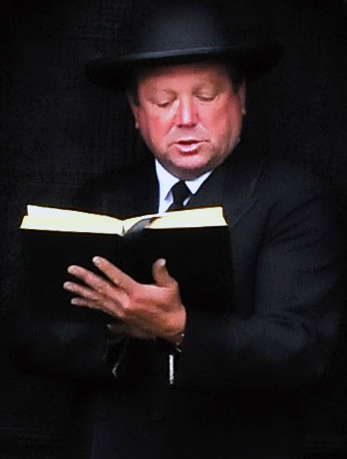Whiplash Wednesday – A Look At Preachy Fiction
In this new category—Whiplash Wednesday, an off-shoot of Throwback Thursday—Yvonne Anderson‘s article about preachy fiction delves into the Christian distinctive of Christian fiction.
From time to time Christian novelists inevitably look at the intersection of our faith and our stories. At the same time, readers wonder what they should expect from a novel put out by a Christian, whether as an independent or through a small or large traditional press, Christian or general market. A few years ago one of Spec Faith’s regular columnists tackled the subject.
For what it’s worth, I agree—sort of. I certainly agree in principle with what Yvonne wrote. I tend to think, however, that there are many approaches in accomplishing the shared goal. See what you think and let us know in the comments.
– – – – –
How Can They Hear
By Yvonne Anderson
 A common complaint with Christian fiction is that it’s too preachy. Personally, I’m more apt to be dissatisfied because it’s not preachy enough.
A common complaint with Christian fiction is that it’s too preachy. Personally, I’m more apt to be dissatisfied because it’s not preachy enough.
Before you prepare the tar and feathers, please hear me out.
Maybe “preachy” isn’t the word I want, if preachy means, as one source defines it, “Having or revealing a tendency to give moral advice in a tedious or self-righteous way.” The “tedious or self-righteous” bit is a valid objection; no matter what the message, those qualities make for bad writing. They’re not particularly desirable in conversation, either. That sort of thing is just plain annoying.
Merriam-Webster’s definition is a little more vague: “marked by obvious moralizing.” What, exactly, constitutes moralizing? and at what point does understandable become too obvious? Is it only objectionable when Christians do it? or should, say, the makers of the movie Avatar be taken to task?
While you’re mulling those questions, here’s another for you: How effectively can Christ’s disciples carry out the Great Commission if they never spell out what they’re talking about?
Yeah, yeah, I know: Jesus spoke in parables. But how many of those parables were directed toward the lost? Not many. Jesus told stories to confuse the faithless while illustrating truths He wanted His followers to understand (Matthew 13:11-13). And, as you may notice, even the disciples often didn’t get the point until He explained.
Another familiar example of scriptural storytelling is found in 2 Samuel 12. The prophet Nathan told King David about a wealthy man who took a poor man’s pet lamb to feed a his guest, thus sparing his own flock. Nathan got the desired response from David – outrage. But until he explained the parable, the king didn’t get that the story was about him.
In other words, unless they’re accompanied by clear preaching, most parables are lost on the lost.
Moreover, Jesus didn’t only tell parables; on some occasions, He spoke plainly. I am the way, the truth, and the life; no one comes to the Father but by me is pretty blunt, if you ask me.
If we truly believe Jesus is the world’s only hope, I think we have a moral obligation to say so. In 2 Kings 7:9, even the lepers knew they had to share the life-saving good news with the rest of the city. More to the point, Jesus commanded us to tell the world. I’ve never seen any scriptural justification for saying, “No, thanks, I’ve got better things to do.”
And let’s not forget what Paul said in Romans 10:14 (paraphrased): how can they believe in Jesus if they’ve never heard of Him? And how are they supposed hear without a preacher?
I’m not suggesting everything we write must include a Romans Road-style plan of salvation. But as Christians, everything we write (as well as everything we say and do) should reflect His truth without distortion.
In his guest post on this blog last Friday, Robert Treskillard related how the Lord used Christian speculative fiction as a tool to draw him to Christ:
…a friend shared The Chronicles of Narnia with me and explained that Aslan represented Christ. This opened my eyes to things I had rarely, if ever, thought about. Within three years, God brought me to faith.” Don’t miss the part where he said “a friend… explained…
Because Aslan’s substitutionary sacrifice was so obviously a picture of Christ’s, it was easy for the friend to use it as an illustration. Nor was it difficult for Mr. Treskillard to get the picture.
“But,” you may say, “not every story needs to be about salvation.” No argument here. But whatever the theme, our stories should give an accurate reflection of God’s attributes. Christian characters (or those that represent them in speculative fiction) should be believable and lead lives a reader would want to emulate. Scriptural values should be valued and sin should not be glorified. Let’s show the world what Christianity’s really all about.
Though we should labor to get the point across with skill and finesse, we should, in fact, get the point across. Most importantly, let’s not be afraid to talk about Jesus—because it’s all about Him, you see. We can make all the vague allusions we want. We can write plainly about God and heaven. But unless Jesus Christ is the foundation of our stories, they’re flammable. Wood, hay, and stubble.
As Christians, our prime directive is to take the gospel of salvation to the world. How God would have each of us do this is between Him and the individual. For most of us, I suspect it will be a combination of writing and something else, something carried out through the vehicle of the church. But if we are called to write, let’s endeavor to make sure what we write is in line with our calling.









































Yvonne makes some great points, especially about who the audience of Jesus’ parables were and the fact that they needed explanation. I’ve definitely got some “chewing” to do.
That said, here’s my next thought: Robert Treskillard probably would not have given the Chronicles of Narnia a second glance if he had known that it was Christian fiction, either through its marketing or through some overt message in the books. People today are just conditioned to avoid Christian fiction based on numerous assumptions. So the fact that the Chronicles of Narnia was marketed to a general audience by a secular publisher and was only symbolically (not overtly) Christian enabled him to give the book a chance. Thank God for the friend who explained Aslan to him–but I’m wondering if Mr. Treskillard’s experience would have been the same if the book itself had done the explaining, or Lewis had left an explanatory postscript. “By the way, Aslan equals Jesus…”
I applaud the theory of clear “preaching” of the truth, but the reality needs a very thoughtful and nuanced approach or secular readers will run away from a book they might love and be spiritually enriched by simply because of their negative assumptions.
Yaasha, I think all your points are good. We are writing in a different time from the one in which Lewis found himself. So, you’re right—too often those who don’t know Christ will steer clear of anything advertised as Christian because they have a negative image of it, of us, and maybe even of Christ Himself.
The negative image idea is one that is hard to counter if those who don’t believe in the gospel aren’t exposed to a different sort of Christian from what they’ve been presented with by the secular media, and by some Christians, too.
Here’s the paragraph I found challenging in Yvonne’s article:
Here’s what you said about a nuanced approach comes into play. Christian characters, for too long, have seemed unrealistically good, and non-Christians, unrealistically bad. There needs to be more subtlety, which does risk readers “not getting it.” I think that’s a risk we should take. God is able to bring the friend alongside to explain how Jesus is like Aslan. We need to trust Him. We need to do our part to faithful write a good story that portrays God and/or Christians accurately and realistically. Then we need to let the Holy Spirit do the job of convicting and convincing readers.
Becky
Yes, yes, and yes. There’s an inherent risk, but, like you said, a requirement of trust. I think we try too hard to do the Holy Spirit’s job. We have a responsibility to tell a truthful story, but the results are His.
EXACTLY!! 😉
Thank you, Yvonne, for taking this stance … it is refreshing and goes against the tide of opinion that is so often expressed about Christian fiction … you mean someone might actually appreciate my clear Christian content? Wow!
If you do want to speak about Christ openly as an author then this is a hard line to walk, though: the one side being too preachy, on the other, too vague.
Anyway, interesting topic!
If anyone wants to read the full story of how God used C. S. Lewis to lead me to Christ, you can do so here: http://www.epictales.org/treskillard/2009/10/15/my_personal_thanks_to_c_s_lewis/
Yvonne’s post hits the nail squarely on the head and is a refreshing alternative to the “Don’t-pull-the-God-and-very-soon-it-will-be-Don’t-pull-the-J-Card” mantra we’re hearing today. That being said, this is but one of two extremes. The other extreme is to be just what the title of the post says, “preachy.” That too being said, personally I do not believe every unbeliever is necessarily going to flee every book characterized as “Christian” and I question how often this assertion is made, as if this entitles us to write just like the world with no discernible difference between what we do and what they do because we don’t want to “turn them off” or be, well, “preachy.”. We do indeed need to speak to the world, in our writing as well as in all of life. This doesn’t mean we beat and bludgeon, but it does mean, like Yvonne advocates, sometimes we must speak with clarity and Truth and not fear the result. Our purpose should not be to sell books, if that means avoiding the One who died for us. What it does mean is by prayer, reliance on the Holy Spirit and above all seeking our methods and models in the Word of God, we write what God has laid on our hearts the way He — not us, and not the world — desires it to be. This is individual, for each of us will give an account to the Lord of what we wrote, and why. Let’s take Yvonne’s post in the spirit in which it was intended, and let us seek God. I intend to.
Hmm. Lots to mull over here. I do believe part of the difficulty as mentioned by Yansha is this whole publishing phenomena of “Christian” fiction. As soon as you set that box up, it is easy to make the assumption that everything published outside that box is, by definition, “non-Christian”. It’s a ghettoization of the Christian message, in other words. And I tend to think, on my cynical days, that if a person really wants to reach the “lost” with the message of Christ the writer should actually publish outside of that box so that the lost will actually read it. Because I do believe that it is true that it is hard to get a non-Christian (pre-Christian? not sure the right word!) to be interested in reading a book marketed as “Christian fiction”. I don’t think there is necessarily anything wrong with Christian fiction marketed and sold to Christians, I mean, why can’t we have our own stories like everyone else? We can write and read stories that are specifically meant for the flock, as encouragement or whatever. But so many Christian writers think that their words are going to be used as an evangelism tool, and I suspect that the reality is far different. And it’s not to say that writing an explicitly “Christian” book means you can’t get published by the mainstream publishers. “Gilead” by Marlynne Robinson is the most stunning example – a more beautiful Christian book you could hardly find AND it won the Pulitzer Prize. Also “Peace Like A River” by Leif Enger. But the quality of writing in both these books is far above what I see in many CBA books. And that, I think, is also part of this problem. We need to up our game as Christian writers. Write books that are so good in story and craft that people can’t help but love them, Christian and non-Christian alike. That’s how we will woo the world, in my opinion.
Lisa, I agree with a good deal of what you’re saying. I happen to think a lot of Christians have stepped up their game and are writing really good stories, really well.
As for the “ghettoization” of Christian fiction, that’s beyond the ability of the writer to control. Publishers have pushed to get their books into general market bookstores (the few that remain) and off the “Inspirational Fiction” shelves. There’s been some success, but I don’t know if it’s actually helped bring those who aren’t Christians into the readership.
I think there’s a third way: Christians can give their reader friends and neighbors the good books that show some element of spiritual truth. What about neighborhood book clubs? Wouldn’t that be cool! Anyway, I think Christian fiction could be a talking point for a believer to bring up the gospel to his unbelieving friends.
Becky